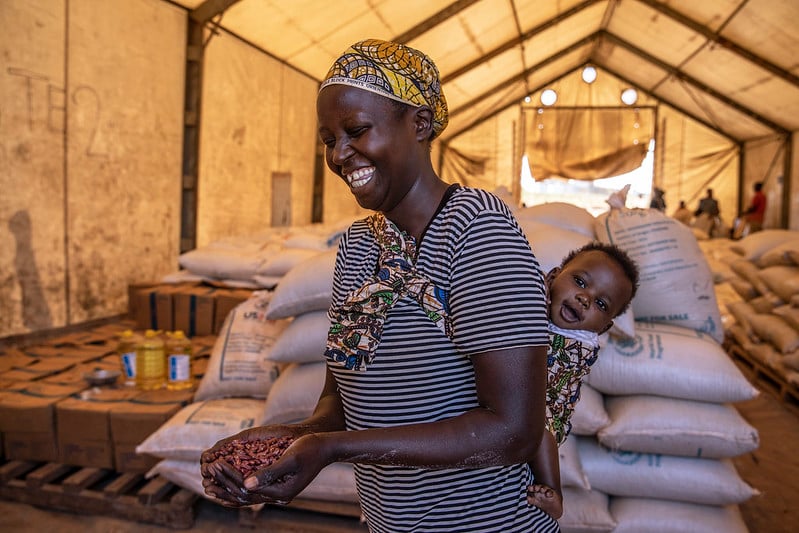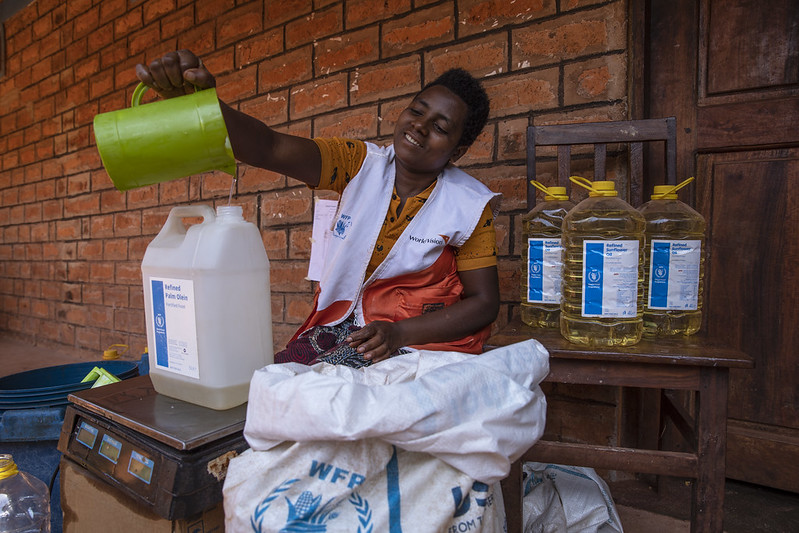
WFP and UNHCR’s PING seeks to turn a labor-intensive process into a much more efficient one. © WFP/Gabriela Vivacqua
Authors: Anna Gallinat (UNHCR Associate Communication Officer) and Esther Mngodo (WFP Communications Officer)
It is common practice for UNHCR, the UN Refugee Agency, and WFP, World Food Programme, to collaborate in some of the world’s most difficult humanitarian responses. While UNHCR is mandated to protect those forced to flee, WFP is responsible for delivering food and life-saving assistance in emergencies and protracted refugee situations. The two organizations work together to serve the most vulnerable populations.
As part of this collaboration, UNHCR and WFP may need to exchange some information on the forcibly displaced populations to ensure they receive targeted food assistance in a dignified manner.
In 2018, an addendum to the global-level agreement between WFP and UNHCR came into force with focus on data sharing, ensuring that all the data exchanges are based on international and United Nations’ data protection and privacy standards.
Data sharing arrangement in Tanzania
Both organizations have their own data systems in place. At the center of UNHCR’s work with registration and identity management lies PRIMES, UNHCR’s digital Population Registration and Identity Management Ecosystem. PRIMES brings together all of UNHCR’s digital registration, identity management, and case management tools into one internally connected and interoperable ecosystem.
On the other hand, WFP’s digital beneficiary information and transfer management platform, SCOPE, provides a comprehensive view of the people we serve. “This is done through registration, distribution planning, entitlement transfers and distribution reporting,” explains John Msocha, WFP Tanzania Head of IT Operations. Furthermore, SCOPE facilitates the secure management of the intervention from its creation to the delivery of the assistance.
As Tobias Tjivirura, UNHCR Registration and Identity Management Officer in Tanzania, wonders: “How can we now get PRIMES and SCOPE to talk to each other? Or in other words: how can we transfer data more efficiently – in both directions?”
This is where the PRIMES Interoperability Gateway (PING) comes in. UNHCR recently introduced PING as a new tool in its data ecosystem. It allows for safe, secure, and efficient data transfers with other organizations’ systems – in this case WFP’s SCOPE.
Close to the date of food distribution in the refugee camps of Nyarugusu and Nduta in Western Tanzania, WFP sends a request for transfer of data via PING. The requested data includes information such as names and address. As Tobias explains: “We don’t share more data than absolutely necessary; to minimize, as much as possible, the risks that come with regular data sharing.”
“Once we receive the data from PING, we upload it into SCOPE for assistance planning. The information is subsequently synchronized onto our portable mPOS devices used during food distributions. These help us verify identities of beneficiaries, ensuring that the right person receives the intended entitlement; and print receipts for the food baskets. Refugees then collect the food basket, containing beans, sugar, salt, maizemeal and other items in exchange of the receipt,” says WFP’s Msocha.

UNHCR and WFP roll out PING to share data for the General Food Distribution in Nyarugusu Camp. ©UNHCR/Maimuna Mtengela
The SCOPE system stores information of beneficiaries who showed up for food collection, data that is shared back to UNHCR via PING and uploaded into UNHCR’s PRIMES system. This information is crucial for UNHCR to gain better visibility of the camps’ composition. Among other aspects, more accurate data greatly improves the room for advocacy with the government and other actors when an exact picture of a camp’s population is available.
Benefits of PING in Tanzania
For UNHCR’s Tobias Tjivirura, it was a lightbulb moment when PING was rolled out: “We realized what the system can do and how what is now a labor-intensive process will become much more efficient. As such, PING’s capabilities are truly a game-changer for us.”
WFP’s Head of Kasulu Sub Office, Saidi Johari, echoes these sentiments, and adds: “The interoperability project has enhanced coordination between WFP and UNHCR. It opens the door for further engagement and utilization of common services in the camps to serve the beneficiaries. In particular, it brings efficiencies in data management and guarantees data security through direct data exchange on the two platforms.”
The population of the refugee camps in Tanzania is very dynamic, due to repatriations, births or other changes to family composition. Since PING is directly linked to UNHCR’s registration database, it is now possible to share the most up-to-date data with WFP. Based on this, WFP can provide more accurate food baskets, which are based on age profiles and family composition.
Sharing the data via PING has brought three major changes for both UNHCR and WFP. Firstly, PING automates the process of data sharing, which was previously tedious and manual. Secondly, PING allows bi-directional data transfer, meaning UNHCR shares data with WFP and the other way around. Thirdly, biometric data can be added to the initial transfer, adding a new layer of identity checks, which previously was not available making sure that the assistance reaches the intended beneficiaries.
No need to reinvent the (collaboration) wheel

The new PING system will integrate WFP and UNHCR’s data systems in the camps to serve the refugees better. © WFP/Gabriela Vivacqua
While previous agreements of collaboration, including data protection considerations, were already in place between UNHCR and WFP in Tanzania, PING automated the processes. Existing relationships between colleagues of both organizations and a general excitement about the possibilities of PING led to a very collaborative work environment, where everyone works to achieve better outcomes for refugees and asylum-seekers.
“We were excited about this innovative approach from both organizations. The capabilities to ease our manual work, get more up-to-date data, and focus on what truly matters; food assistance to those in need – really sold us on the process from the beginning,” says Saidi Johari.
Moreover, Tobias Tjivirura shares: “Rolling out PING in Tanzania is part of a series of pilots and we are grateful for the partnership with WFP to improve the system together.”
The future of PING will see an end-to-end system integration between the two organization’s beneficiaries’ management platforms through APIs (Application Programming Interface) with an aim to reduce repetitive tasks and improve operational efficiency.
